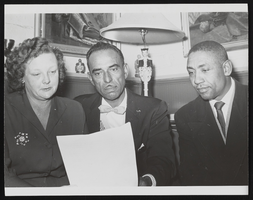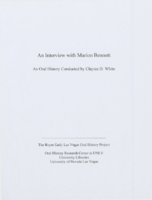Search the Special Collections and Archives Portal
Search Results
Aaron Williams oral history interview
Identifier
Abstract
Oral history interview with Aaron Williams conducted by Claytee D. White on August 16, 2005 for the Boyer Early Las Vegas Oral History Project. Williams recalls individuals he worked with, such as Woodrow Wilson, Jimmy Gay, and the mayor of Los Angeles, California. He remembers the Westside Federal Credit Union, joining the National Association for the Advancement of Colored People (NAACP), and encountering discrimination at one of the first jobs he had at the Sahara Hotel. He shares anecdotes of Robert Maheu, Steve Wynn, Lubertha Johnson, Ruby Duncan, Mabel Hoggard, and other Las Vegas, Nevada notables.
Archival Collection
Gene Collins oral history interview
Identifier
Abstract
Oral history interview with Gene Collins conducted by Claytee D. White on July 16, 2009 for the Boyer Early Las Vegas Oral History Project. Collins discusses the job market in Las Vegas, Nevada and delineates his work experience and career as culinary employee, operation engineer, and finally as electrician at the Nevada Test Site. He then talks about becoming a Nevada State Assemblyman and helping to bring diversification, jobs, and businesses to the black community. Collins details the accomplishments of the National Association for the Advancement of Colored People (NAACP) during those years and discusses the means by which they were met, including marches and protests.
Archival Collection

Local UN gathering, image 001
Date
Description
Image
Audio recording clip of interview with Helen Anderson Toland by Claytee D. White, February 21, 2007
Date
Archival Collection
Description
Part of an interview with Helen Anderson Toland by Claytee White on February 21, 2007. Toland discusses her husband, civil rights activist Jim Anderson, and the people who worked in the Las Vegas NAACP.
Sound

Transcript of Interview with Marion Bennett, July 2, 2009
Date
Archival Collection
Description
Marion Bennett has served twice as local NAACP President. He also talks about the integration of casinos, schools, and housing. Marion has been the pastor for Zion Methodist for over 40 years.
Text
Gaines, Lovell
Lovell Gaines was born in Louisiana and went to Louisiana State University. He moved to Reno, Nevada after serving in the Vietnam war. Gaines taught for one year and then worked for the Nevada Department of Corrections for thirty-plus years. He was extensively involved in the Reno chapter of the National Association for the Adancedment of Colored People (NAACP). Then when he moved to Las Vegas, Nevada in 1975, he ran for and became the local NAACP chapter president. He served as president from 1980 to 1982.
Person
Ruby Amie-Pilot oral history interview
Identifier
Abstract
Oral history interview with Ruby Amie-Pilot conducted by Barbara Tabach on August 07, 2012 for the African Americans in Las Vegas: a Collaborative Oral History Project. Amie-Pilot discusses various topics including the importance of the Zion United Methodist Church, experiences of segregated schools in the lower grades, and change in racism over time, from Texas to Las Vegas, Nevada. Amie-Pilot also talks about leaders of the local National Association for the Advancement of Colored People (NAACP) members including Hank Greenspun and members of the local black community.
Archival Collection
Lubertha Johnson oral history interview
Identifier
Abstract
Oral history interview with Lubertha Johnson conducted by Larry Buckner on February 10, 1978 for the Ralph Roske Oral History Project on Early Las Vegas. In this interview Lubertha Johnson discusses her family background, work experience, civic activity, and philosophy. She talks about discrimination in the workplace for Black people, segregation in Las Vegas, Nevada, and her forty year membership in the National Association for the Advancement of Colored Peoples (NAACP). She also discusses the historic Westside neighborhood and its schools, the prejudice Black performers faced in the 1950s and 1960s, and how she feels disappointed in President Jimmy Carter.
Archival Collection
Woodrow Wilson oral history interview
Identifier
Abstract
Oral history interview with Woodrow Wilson conducted by Perry Kaufman on November 01, 1977 for the Ralph Roske Oral History Project on Early Las Vegas. Wilson discusses work at the McNary sawmill in Arizona, and later arriving in Las Vegas, Nevada to work at the Basic Magnesium Plant, located in Henderson, Nevada. Wilson also talks about discrimination between maids in motels and hotels, along with moments of segregation at the Basic Magnesium Plant. He then explains how he organized and became a board member of The National Association for the Advancement of Colored People (NAACP) in Las Vegas.
Archival Collection
Timothy C. Williams oral history interview
Identifier
Abstract
Oral history interview with Timothy C. Williams conducted by Claytee D. White on April 14, 2011 for the Boyer Early Las Vegas Oral History Project. In this interview, Williams discusses his personal history in Chicago, Illinois in the 1960s and eventually moving to Las Vegas, Nevada in 1985. He describes his career in law and the increase of African American lawyers in Las Vegas by the end of the 1980s. Williams then talks about the founders and past presidents of the Las Vegas National Bar Association (LVNBA). Lastly, Williams recalls his involvement serving on a committee for the Las Vegas Branch of the National Association for the Advancement of Colored People (NAACP).
Archival Collection
